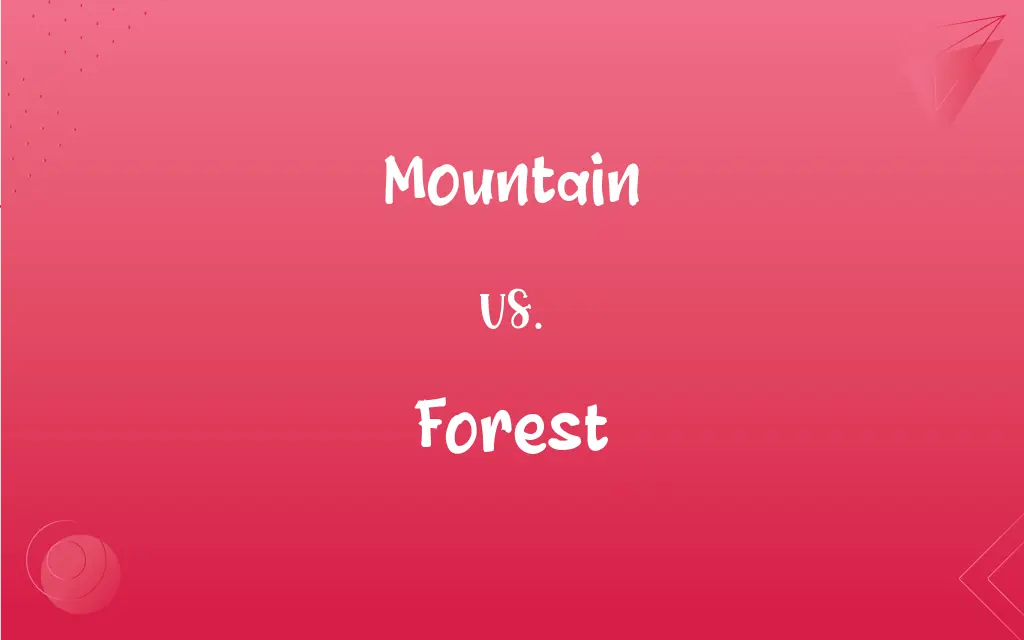Mountain vs. Forest: What's the Difference?
Edited by Harlon Moss || By Janet White || Updated on October 2, 2023
A mountain is a large, natural elevation of the earth's surface; a forest is a large area covered chiefly with trees and undergrowth.

Key Differences
Mountain and forest are two different geographical features that are integral to Earth's ecosystem. A mountain is a significant landform that extends above the surrounding terrain in a limited area. It is generally recognized by its conspicuous height and summit. Mountains can be solitary or part of a mountain range, and they play a crucial role in influencing the climate and weather patterns of a region, offering unique ecosystems and habitats to a variety of flora and fauna.
On the other hand, a forest is a large area predominantly covered with trees, bushes, and undergrowth. It is an essential component of the environment, acting as a carbon sink and producing oxygen, essential for life on Earth. Forests are incredibly diverse, hosting a multitude of plant, animal, and microbial life. They come in various types, like tropical rainforests, temperate forests, and boreal forests, each with distinct characteristics, climates, and ecosystems.
Mountains and forests are interconnected in many ways. Some mountains have forests on their lower slopes, exhibiting a variety of life adapted to different altitudinal zones. As you ascend a mountain, you might traverse through different forest types before reaching the tree line, beyond which trees don't grow. This altitudinal zonation results in a range of habitats, each with its own unique set of species adapted to the specific conditions found at different elevations.
Forests, with their dense vegetation and extensive root systems, are critical in preventing soil erosion on mountain slopes. They help in maintaining the water cycle by absorbing rainfall and releasing it slowly into streams and rivers, thus playing a pivotal role in preserving watersheds. The interconnectedness of mountains and forests illustrates the complexity of ecosystems and highlights the importance of conserving these natural landscapes to maintain biodiversity and ecological balance.
In conclusion, while a mountain is a prominent landform characterized by elevation, a forest is characterized by its dense collection of trees and vegetation. Both mountains and forests are essential ecological entities, supporting myriad life forms and contributing significantly to environmental health and stability. They are irreplaceable components of the Earth's landscape, offering not just ecological benefits but also providing resources, recreation, and inspiration to humans.
ADVERTISEMENT
Comparison Chart
Definition
A large elevation of the earth's surface.
A dense collection of trees and undergrowth.
Classification
Natural landform.
Type of ecosystem.
Characteristics
Elevated, steep, rugged.
Dense, green, biodiverse.
Ecosystem
Varied depending on altitude and location.
Rich in flora and fauna, varied depending on climate and type.
Function
Influences climate, houses unique ecosystems.
Produces oxygen, acts as carbon sink, houses diverse life.
ADVERTISEMENT
Mountain and Forest Definitions
Mountain
A substantial, naturally raised area of land.
The mountain loomed majestically over the valley.
Forest
A large area covered predominantly with trees and underbrush.
The forest was dense and teeming with wildlife.
Mountain
A landform with steep sides and a peak.
The hiker reached the top of the mountain before noon.
Forest
A vital contributor to oxygen production and carbon sequestration.
The forest acted as a crucial carbon sink for the region.
Mountain
An elevation higher than a hill.
The snowy mountain glistened in the morning sun.
Forest
A growth of trees and other plants covering a large area.
Mountain
A prominent feature affecting climate and weather patterns.
The mountain’s presence altered the rainfall in the region.
Forest
A large number of objects bearing a similarity to such a growth, especially a dense collection of tall objects
A forest of skyscrapers.
Mountain
Abbr. Mt. or Mtn. A natural elevation of the earth's surface having considerable mass, generally steep sides, and a height greater than that of a hill.
Forest
A defined area of land formerly set aside in England as a royal hunting ground.
Mountain
A large heap
A mountain of laundry.
Forest
To plant trees on or cover with trees.
Mountain
A huge quantity
A mountain of trouble.
Forest
A dense uncultivated tract of trees and undergrowth, larger than woods.
Mountain
(countable) An elevation of land of considerable dimensions rising more or less abruptly, forming a conspicuous figure in the landscape, usually having a small extent of surface at its summit.
Everest is the highest mountain in the world.
We spent the weekend hiking in the mountains.
Forest
Any dense collection or amount.
A forest of criticism
Mountain
(countable) Something very large in size or quantity; a huge amount; a great heap.
He was a real mountain of a man, standing seven feet tall.
There's still a mountain of work to do.
Forest
(historical) A defined area of land set aside in England as royal hunting ground or for other privileged use; all such areas.
Mountain
(figuratively) A difficult task or challenge.
Forest
(graph theory) A graph with no cycles; i.e., a graph made up of trees.
Mountain
Wine from Malaga made from grapes that grow on a mountain.
Forest
A group of domains that are managed as a unit.
Mountain
A woman's large breast.
Forest
The colour forest green.
Mountain
(cartomancy) The twenty-first Lenormand card.
Forest
(transitive) To cover an area with trees.
Mountain
A large mass of earth and rock, rising above the common level of the earth or adjacent land; earth and rock forming an isolated peak or a ridge; an eminence higher than a hill; a mount.
Forest
An extensive wood; a large tract of land covered with trees; in the United States, a wood of native growth, or a tract of woodland which has never been cultivated.
Mountain
A range, chain, or group of such elevations; as, the White Mountains.
Forest
A large extent or precinct of country, generally waste and woody, belonging to the sovereign, set apart for the keeping of game for his use, not inclosed, but distinguished by certain limits, and protected by certain laws, courts, and officers of its own.
Mountain
A mountainlike mass; something of great bulk; a large quantity.
I should have been a mountain of mummy.
Forest
Of or pertaining to a forest; sylvan.
Mountain
Of or pertaining to a mountain or mountains; growing or living on a mountain; found on or peculiar to mountains; among mountains; as, a mountain torrent; mountain pines; mountain goats; mountain air; mountain howitzer.
Forest
To cover with trees or wood.
Mountain
Like a mountain; mountainous; vast; very great.
The high, the mountain majesty of worth.
Forest
The trees and other plants in a large densely wooded area
Mountain
A land mass that projects well above its surroundings; higher than a hill
Forest
Land that is covered with trees and shrubs
Mountain
A large number or amount;
Made lots of new friends
She amassed a mountain of newspapers
Forest
Establish a forest on previously unforested land;
Afforest the mountains
Mountain
Relating to or located in mountains;
Mountain people
Forest
A complex ecosystem hosting diverse plant and animal life.
The forest canopy was alive with the sounds of birds and insects.
Mountain
A place with varied ecosystems depending on altitude.
The mountain was home to a variety of unique species.
Forest
A region characterized by its tree density and canopy cover.
The forest floor was covered in a layer of fallen leaves.
Forest
A renewable resource providing timber, medicine, and recreation.
The forest was a popular destination for hikers and nature lovers.
FAQs
Do mountains affect weather patterns?
Yes, mountains can influence local weather and broader climate patterns.
Can forests exist without mountains?
Yes, forests can exist in flat areas as well as mountainous regions.
Are all mountains tall?
While mountains are generally tall, their heights can vary significantly.
Do forests impact the atmosphere?
Yes, forests absorb carbon dioxide and release oxygen, impacting atmospheric composition.
Is every elevated landform a mountain?
No, elevated landforms less prominent than mountains are usually called hills.
Can forests be found in desert regions?
Yes, some forests adapt to arid climates, like the desert forests.
Are mountains found in every continent?
Yes, mountains are found on every continent, including Antarctica.
Can forests exist in very cold climates?
Yes, boreal forests thrive in subarctic regions with cold climates.
Are all forests public property?
Forests can be public or private, depending on land ownership.
Can a mountain have forests?
Yes, many mountains have forests on their lower slopes.
Can mountains exist underwater?
Yes, underwater mountains, or seamounts, exist in the oceans.
Are all forests dense?
Forest density can vary depending on the type of forest and its location.
Do all mountains have peaks?
Most mountains have peaks, but some have flat, rounded, or plateaued tops.
Are forests always green?
While many forests are green, colors can vary depending on the season and tree types.
Are the words mountain and forest nouns?
Yes, both mountain and forest are nouns denoting geographical features.
About Author
Written by
Janet WhiteJanet White has been an esteemed writer and blogger for Difference Wiki. Holding a Master's degree in Science and Medical Journalism from the prestigious Boston University, she has consistently demonstrated her expertise and passion for her field. When she's not immersed in her work, Janet relishes her time exercising, delving into a good book, and cherishing moments with friends and family.
Edited by
Harlon MossHarlon is a seasoned quality moderator and accomplished content writer for Difference Wiki. An alumnus of the prestigious University of California, he earned his degree in Computer Science. Leveraging his academic background, Harlon brings a meticulous and informed perspective to his work, ensuring content accuracy and excellence.
































































